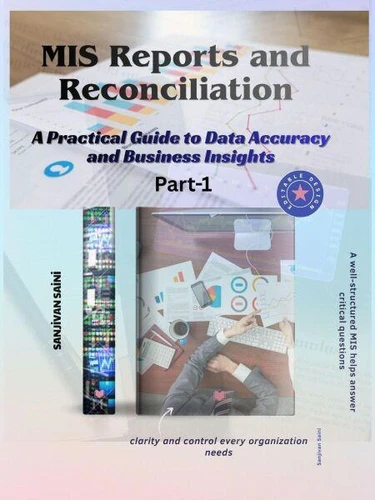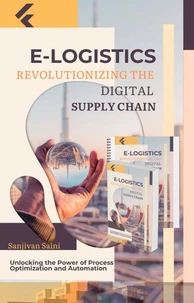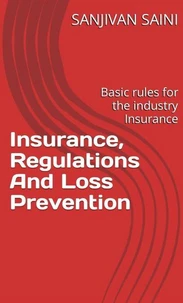Nouveauté
MIS Reports and Reconciliation A Practical Guide to Data Accuracy and Business Insights. The Supply Chain Journey, #1
Par :Formats :
Disponible dans votre compte client Decitre ou Furet du Nord dès validation de votre commande. Le format ePub est :
- Compatible avec une lecture sur My Vivlio (smartphone, tablette, ordinateur)
- Compatible avec une lecture sur liseuses Vivlio
- Pour les liseuses autres que Vivlio, vous devez utiliser le logiciel Adobe Digital Edition. Non compatible avec la lecture sur les liseuses Kindle, Remarkable et Sony
 , qui est-ce ?
, qui est-ce ?Notre partenaire de plateforme de lecture numérique où vous retrouverez l'ensemble de vos ebooks gratuitement
Pour en savoir plus sur nos ebooks, consultez notre aide en ligne ici
- FormatePub
- ISBN8232881245
- EAN9798232881245
- Date de parution03/11/2025
- Protection num.pas de protection
- Infos supplémentairesepub
- ÉditeurDraft2Digital
Résumé
In today's data-driven world, every decision - from strategic planning to day-to-day operations - depends on information. But information is only as good as its accuracy and timeliness. Across industries, professionals are flooded with reports, spreadsheets, and dashboards, yet many struggle to trust the numbers in front of them. This is where MIS Reports and Reconciliation become indispensable.1.
The Bridge Between Data and DecisionsMost organizations generate vast amounts of data through ERP systems, CRMs, and manual logs. However, without proper management, this data remains scattered and inconsistent. MIS (Management Information Systems) transforms raw data into actionable intelligence - the kind that enables leaders to track performance, identify inefficiencies, and make informed choices.
This book explains how to design, structure, and manage MIS reports that truly reflect business reality - not just numbers on a screen. 2. Ensuring Data Accuracy Through ReconciliationData errors, mismatched entries, and system discrepancies can silently erode trust in your reports. Reconciliation ensures that what's recorded in one system aligns with what exists in another - whether it's cash in the bank, stock in the warehouse, or invoices in accounts.
This book provides step-by-step frameworks and best practices to perform reconciliation efficiently - reducing financial risks, improving audit readiness, and building data integrity across the organization. 3. A Practical Approach, Not Just TheoryUnlike academic texts, this book is built around real-world practices, templates, and examples from industries such as finance, logistics, supply chain, and retail.
Each chapter translates complex concepts into clear, usable methods - from designing MIS dashboards in Excel to automating reconciliation with Power Query or ERP tools. You'll learn what to do, how to do it, and why it matters. 4. For Professionals Across RolesWhether you are: A finance professional managing daily reconciliations, A supply chain analyst preparing performance dashboards, A business manager seeking accurate insights, or A student or beginner entering the corporate analytics world - this book provides the foundation and tools needed to master both MIS reporting and reconciliation with confidence. 5.
Building a Culture of Data IntegrityUltimately, effective MIS reporting and reconciliation are not just about systems or spreadsheets - they are about trust. Trust in data, trust in processes, and trust in decisions. By the end of this book, you'll not only know how to prepare accurate reports but also understand how to build a culture of accountability and continuous improvement around data management - a skill that sets apart efficient teams and high-performing organizations.
The Bridge Between Data and DecisionsMost organizations generate vast amounts of data through ERP systems, CRMs, and manual logs. However, without proper management, this data remains scattered and inconsistent. MIS (Management Information Systems) transforms raw data into actionable intelligence - the kind that enables leaders to track performance, identify inefficiencies, and make informed choices.
This book explains how to design, structure, and manage MIS reports that truly reflect business reality - not just numbers on a screen. 2. Ensuring Data Accuracy Through ReconciliationData errors, mismatched entries, and system discrepancies can silently erode trust in your reports. Reconciliation ensures that what's recorded in one system aligns with what exists in another - whether it's cash in the bank, stock in the warehouse, or invoices in accounts.
This book provides step-by-step frameworks and best practices to perform reconciliation efficiently - reducing financial risks, improving audit readiness, and building data integrity across the organization. 3. A Practical Approach, Not Just TheoryUnlike academic texts, this book is built around real-world practices, templates, and examples from industries such as finance, logistics, supply chain, and retail.
Each chapter translates complex concepts into clear, usable methods - from designing MIS dashboards in Excel to automating reconciliation with Power Query or ERP tools. You'll learn what to do, how to do it, and why it matters. 4. For Professionals Across RolesWhether you are: A finance professional managing daily reconciliations, A supply chain analyst preparing performance dashboards, A business manager seeking accurate insights, or A student or beginner entering the corporate analytics world - this book provides the foundation and tools needed to master both MIS reporting and reconciliation with confidence. 5.
Building a Culture of Data IntegrityUltimately, effective MIS reporting and reconciliation are not just about systems or spreadsheets - they are about trust. Trust in data, trust in processes, and trust in decisions. By the end of this book, you'll not only know how to prepare accurate reports but also understand how to build a culture of accountability and continuous improvement around data management - a skill that sets apart efficient teams and high-performing organizations.
In today's data-driven world, every decision - from strategic planning to day-to-day operations - depends on information. But information is only as good as its accuracy and timeliness. Across industries, professionals are flooded with reports, spreadsheets, and dashboards, yet many struggle to trust the numbers in front of them. This is where MIS Reports and Reconciliation become indispensable.1.
The Bridge Between Data and DecisionsMost organizations generate vast amounts of data through ERP systems, CRMs, and manual logs. However, without proper management, this data remains scattered and inconsistent. MIS (Management Information Systems) transforms raw data into actionable intelligence - the kind that enables leaders to track performance, identify inefficiencies, and make informed choices.
This book explains how to design, structure, and manage MIS reports that truly reflect business reality - not just numbers on a screen. 2. Ensuring Data Accuracy Through ReconciliationData errors, mismatched entries, and system discrepancies can silently erode trust in your reports. Reconciliation ensures that what's recorded in one system aligns with what exists in another - whether it's cash in the bank, stock in the warehouse, or invoices in accounts.
This book provides step-by-step frameworks and best practices to perform reconciliation efficiently - reducing financial risks, improving audit readiness, and building data integrity across the organization. 3. A Practical Approach, Not Just TheoryUnlike academic texts, this book is built around real-world practices, templates, and examples from industries such as finance, logistics, supply chain, and retail.
Each chapter translates complex concepts into clear, usable methods - from designing MIS dashboards in Excel to automating reconciliation with Power Query or ERP tools. You'll learn what to do, how to do it, and why it matters. 4. For Professionals Across RolesWhether you are: A finance professional managing daily reconciliations, A supply chain analyst preparing performance dashboards, A business manager seeking accurate insights, or A student or beginner entering the corporate analytics world - this book provides the foundation and tools needed to master both MIS reporting and reconciliation with confidence. 5.
Building a Culture of Data IntegrityUltimately, effective MIS reporting and reconciliation are not just about systems or spreadsheets - they are about trust. Trust in data, trust in processes, and trust in decisions. By the end of this book, you'll not only know how to prepare accurate reports but also understand how to build a culture of accountability and continuous improvement around data management - a skill that sets apart efficient teams and high-performing organizations.
The Bridge Between Data and DecisionsMost organizations generate vast amounts of data through ERP systems, CRMs, and manual logs. However, without proper management, this data remains scattered and inconsistent. MIS (Management Information Systems) transforms raw data into actionable intelligence - the kind that enables leaders to track performance, identify inefficiencies, and make informed choices.
This book explains how to design, structure, and manage MIS reports that truly reflect business reality - not just numbers on a screen. 2. Ensuring Data Accuracy Through ReconciliationData errors, mismatched entries, and system discrepancies can silently erode trust in your reports. Reconciliation ensures that what's recorded in one system aligns with what exists in another - whether it's cash in the bank, stock in the warehouse, or invoices in accounts.
This book provides step-by-step frameworks and best practices to perform reconciliation efficiently - reducing financial risks, improving audit readiness, and building data integrity across the organization. 3. A Practical Approach, Not Just TheoryUnlike academic texts, this book is built around real-world practices, templates, and examples from industries such as finance, logistics, supply chain, and retail.
Each chapter translates complex concepts into clear, usable methods - from designing MIS dashboards in Excel to automating reconciliation with Power Query or ERP tools. You'll learn what to do, how to do it, and why it matters. 4. For Professionals Across RolesWhether you are: A finance professional managing daily reconciliations, A supply chain analyst preparing performance dashboards, A business manager seeking accurate insights, or A student or beginner entering the corporate analytics world - this book provides the foundation and tools needed to master both MIS reporting and reconciliation with confidence. 5.
Building a Culture of Data IntegrityUltimately, effective MIS reporting and reconciliation are not just about systems or spreadsheets - they are about trust. Trust in data, trust in processes, and trust in decisions. By the end of this book, you'll not only know how to prepare accurate reports but also understand how to build a culture of accountability and continuous improvement around data management - a skill that sets apart efficient teams and high-performing organizations.





















